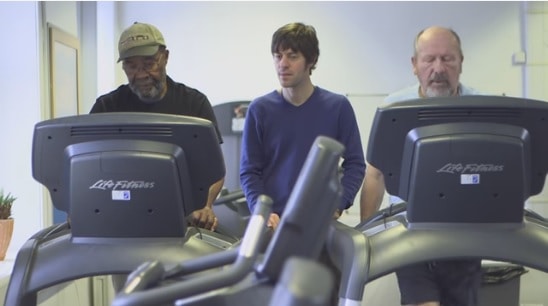
Trial launched to test exercise as prostate cancer treatment
pharmafile | January 6, 2016 | News story | Research and Development | Cancer Research UK, active surveillance, exercise, prostate cancer
Cancer Research UK has launched a study to determine if exercise could help men with prostate cancer, the UK’s most common male cancer.
The first-of-its-kind trial aims to test whether regular exercise can help prevent prostate cancer from spreading to other parts of the body and if it could be a viable NHS treatment.
The PANTERA study, led by Sheffield Hallam University, will focus on 50 men who have the disease, but whose cancer has not spread. Half the men will do two-and-a-half hours of aerobic exercise every week for 12 months – initially with a qualified trainer, and then with free gym access – while the other half will be given information about the benefits of exercise for cancer patients, but no supervised sessions.
Prostate cancer that has not spread is sometimes treated with surgery or radiotherapy, but the potential for side-effects leads many men to instead opt to monitor the disease through active surveillance. All the men in PANTERA will remain on active surveillance and be closely monitored as part of the study.
If the participants can successfully maintain their exercise regime for 12 months, the study is expected to lead to a full-scale trial to examine the potential benefits of combining active surveillance and exercise for some prostate cancer patients.
Study leader Dr Liam Bourke, principal research fellow at Sheffield Hallam University, says: “Evidence suggests that men who are physically active after a prostate cancer diagnosis have better cancer survival than men who aren’t active. It’s not clear yet how this works, but it might be that exercise affects the way some genes regulate cancer cell growth and DNA repair.
“The clinical academic team in Sheffield have been working hard for eight years to develop the intervention that is being tested in this exciting study. It builds on what we already know and is the first step towards finding out whether exercise could be an effective and practical NHS treatment for localised prostate cancer. If we show it works and is feasible, it could be a real leap forward and good news for cancer patients.”
In the UK, prostate cancer is the most common cancer in men with around 43,400 new cases diagnosed each year and around 10,800 deaths. Many types of prostate cancer grow extremely slowly and are not likely to spread, while others are more aggressive.
David Curtis, 68, from Sheffield, was diagnosed with early prostate cancer in March 2014 and has been exercising as part of the PANTERA study for several weeks. He comments: “I was never someone to go to the gym, even though I’ve always been active, but now I go to the gym twice a week and do lots of walking. Since starting on the study, I’ve started to lose weight and my PSA level has come down which is a really positive indicator. I feel privileged to be on the study and pleased to be part of any research which might be useful to others.”
A PSA test determines the level of prostate specific antigen (PSA) in the blood. Although the PSA protein is produced by both cancerous and non-cancerous prostate cells, a raised level can indicate issues with the prostate, including cancer. Study researchers will examine the effect of regular exercise on the body, including on PSA levels.
Professor Malcolm Mason, Cancer Research UK’s prostate cancer expert, says: “Taking exercise is good for all of us, whether or not we have cancer, but this interesting study could help discover whether it’s particularly helpful and a viable, additional treatment for some prostate cancer patients. Focusing on patients whose disease is under active surveillance, rather than being treated in other ways, provides a fantastic opportunity to monitor the effects of exercise on prostate cancer – and could even shed light on its potential as a supplemental therapy for other types of cancer.”
Joel Levy
Related Content

Blue Earth announces first UK patient received prostate cancer injection
Blue Earth Therapeutics, a clinical-stage company specialising in targeted radiotherapeutics, has announced that the first …

Johnson & Johnson seeks EMA approval to accelerate prostate cancer treatment
Johnson & Johnson has submitted an application to the European Medicines Agency for an indication …

Biocon Biologics gains EU approval for bone health therapies
Biocon Biologics has announced that the European Commission has granted marketing authorisation for its denosumab …






